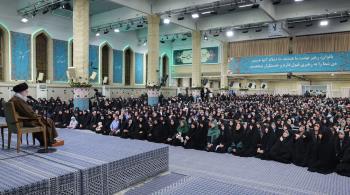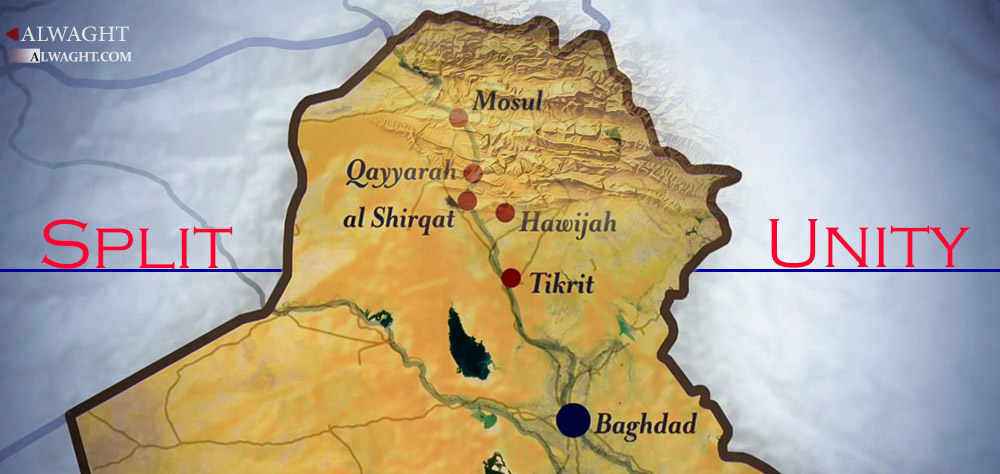Alwaght- At the present conditions, the most important question about Iraq is that if the country would keep its sovereign unity in post-ISIS time. Some analysts and officials of involved countries are talking about possibility of partition of Iraq. They suggest that this is very likely, unless uniting factors block ways of split.
However, in a general view it can be noted that there is a great deal of internal and external capacities and grounds that help stop the partition process.
The article seeks highlighting general objectives of the involved parties and their influences on the future of the Iraqi sovereignty, as well as the approaches and measures taken over the past month by them.
The key players and their goals
The Shiites and central Iraqi government are the leading domestic players in Iraq. Their major aim is to keep Iraq a sovereign state and protect its sovereignty. The Kurdish region in northern Iraq that is led by Kurdistan Democratic Party has asserted that its key goal was independence from Baghdad. Although some parts of political and military forces of the region are not siding with it over independence, it can follow the independence project by itself. In the Sunni community the political forces maintained that they wanted to establish an all-Sunni autonomous region. But this project is delayed to post-ISIS time because ISIS terrorist group has gained control of a large part of Sunni regions. In fact, the rise of ISIS has turned on its head the course of political moves of the Sunni groups of the country. It stopped their projects and now is the active player of the Sunni community of Iraq. It still holds Mosul and wants to keep it as capital of the self-proclaimed caliphate. Over the past year the terrorist group has had no successful operations to capture new territories and has continuously been losing areas to the army forces.
Externally, Turkey still holds Bashiqa military base in Nineveh province in northern Iraq. The Hash al-Watani, a Sunni voluntary force that was founded by a direct support from Ankara and the former governor of Mosul Atheel al-Nujaifi, has been dropped from the upcoming operation to recapture Mosul, and holds very small potentials to exercise influence in the country's political future. On the other side, Turkey is and ally for Kurdistan Democratic Party and supports it in the Kurdish region. An ambiguity overshadows the goals of Turkey for the region and its stance about the independence of the region. All in all, concerning Mosul operation it can be said that Turkey has no strong tool for influence or has no ally inside Iraq other than Kurdistan Democratic Party.
Iran is a supporter of central Iraqi government and fully backs unity and sovereignty of the country.
The US is a key player from out of the region and simultaneously holds relations with both Baghdad and Erbil. There are different views on its objectives in Iraq. The ambiguity about goals and plans of Washington in Iraq originates from multitude of measures and remarks by a large number of the official and unofficial Americans politicians about Iraq. Accordingly, many of the regional analysts suggest that the US support of Kurdistan region's bid for independence or refusing to do so are highly influential in future of Iraq. So, paying special attention to the US officials' objectives and stances can be important in reaching an understanding of the case.
The realities of Washington-Erbil military cooperation protocol
The most significant event in the US relations with Iraq and Kurdistan region in past month is signing the agreement– or actually memorandum of understanding– for military cooperation between the US Department of Defense and the government of the Kurdish region on 12 July in Erbil.
Signing the protocol in Erbil without presence of a representative from the central Iraqi government and with presence of the US Deputy Secretary of Defense on the first days of the deal gave the feeling that it was very likely that Washington would recognize an independent Kurdish state in northern Iraq. Democratic Party's officials and media tried to exaggerate about the protocol and paint it larger in significance that it really was. They tried to say that it carried a political nature and so paved the way for moving towards independence. On the other side, the concerns in Baghdad have pushed some lawmakers in the parliament to speak out against it and call it illegal and in violation of the country's constitution. But gradually and after several days, the Iraqi organizations and some American sources uncovered the realities of the protocol, making it clear that the deal was signed with the knowledge and approval of Baghdad. This meant Baghdad was not dropped from Washington-Erbil cooperation and contacts. Furthermore, the protocol only addressed military fight against ISIS terrorist group and that it did not mean recognition of an independent Kurdish state.
Other US measures and stances
Over the past month, some other American measures and positions concerning Iraq as well as Baghdad, Erbil, and Mosul could be considered as realities helping us know about Washington's general policies in Iraq. They include:
Joe Biden's stance on unity of Iraq
On 4 August the American embassy in Baghdad issued a statement, saying that the US vice-president Joe Biden in a phone call to the Iraqi PM Haider al-Abadi has pledged ongoing US support for a united, federal, democratic Iraq. Biden also said that Baghdad and Erbil needed to work firmly together while the two sides were taking steps to fully obliterate ISIS terrorists. Al-Abadi and Biden said that persistent successes over terrorism were the key factors urged Washington-Baghdad strategic partnership. Biden reiterated US' support for the government of PM al-Abadi in all aspects including the security and military cases.
Joe Biden is in charge of the Iraqi case in the US government, and his direct contacts with the Iraqi officials is indicative of significance of the issue. In this contact, on the one hand reiteration of the US support for unity of Iraq and the central government is considerable. On the other hand, Biden highlighted the necessity for collaboration of Baghdad and Erbil for a successful Mosul recapture operation, showing that beside viewing Baghdad the US also paid attention to the Kurdistan region.
Kurdish region absent in anti-ISIS coalition's Washington meeting
A meeting of foreign and defense ministers of 34 members of anti-ISIS international military coalition was held in Washington. The participants discussed ways to continue the anti-terror campaign. The Iraqi Defense Minister Khaled al-Obeidi took part in the meeting. The US declined to invite the Kurdish region for the meeting, prompting discontent among the region's officials. The government of the Kurdistan region attempts to portrait itself as an independent entity but so far Washington and other countries have failed to consider such a status for the region.
F-16 fighter jets delivery to Baghdad
One of items of the Iraqi government’s military contract with the US is purchasing 36 F-16 fighter jets. So far, the US delivered 10 of them. The schedule for delivery of the rest is finalized and the training of the Iraqi pilots is taking place inside Iraq. The Iraqi ministry of defense announced on 7 August that Washington had delivered four more jets to Baghdad.
The Iraqi air force uses the F-16s in battle against ISIS. This comes while earlier the Kurdish region had criticized Washington for jets sales to Baghdad, arguing that it gave Baghdad a military supremacy.
Decline to deliver heavy weaponry to Kurdistan region
The Kurdish region did its best to buy heavy arms such as tanks, artillery, and helicopters from abroad, but so far it only managed to purchase a couple of rescue choppers. The recent protocol made the US committed to deliver only a couple of artilleries to the region. The West, including Europe and the US, don't sell arms to the Kurdish region because it is not an independent state.
Sending aids to Kurdistan region through Baghdad
All of the foreign aids supply to Iraq including the loans and humanitarian aids for the displaced takes place with knowledge and coordination of Baghdad. So, the Kurdish region has to receive its share from Baghdad.
While Iran is backing unity of Iraq, Saudi Arabia, another player in Iraq, is not holding adequate potentials to help push ahead the Sunni bid for autonomy. Turkey, on the other side, is not following a clear policy about independence of the Kurds of Iraq. The US still has ambiguous stances about the future of the country. What we can take from official stances and measures of the Americans is that they are officially supporting unity of the country, as well as its sovereignty, and the three-part federal system is only a personal idea of Joe Biden and so has no implementation plan. The US holds no native allies in Iraq, and Washington is trying to get the Iraqi government close to its policies. Relations with Kurdistan region has so far been under Iraqi sovereignty.
But these policies are not stable and permanent, and they are likely to change in the future, particularly if the Republicans win the November presidential election. The plan of the Republicans reads that northern Iraq must be a safe zone, and at the same time the Republican nominee Donald Trump sees himself friend of the Kurds. Therefore, it is not enough to oppose partition of Iraq only in words. It must be seen if a country seriously and practically blocks way of independence of the Kurdish region.



























